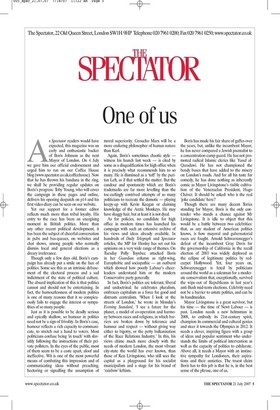One of us
As Spectator readers would have expected, this magazine was an early and enthusiastic backer of Boris Johnson as the next Mayor of London. On 4 July we gave him our official endorsement and urged him to run on our Coffee House blog (www.spectator.co.uk/coffeehouse). Now that he has thrown his bandana in the ring, we shall be providing regular updates on Boris's progress: Toby Young, who will cover the campaign in these pages and online, delivers his opening despatch on p14 and his first video diary can be seen on our website.
Yet our support for a former editor reflects much more than tribal loyalty. His entry to the race has been an energising moment in British politics. More than any other recent political development, it has been the subject of cheerful conversation in pubs and bus-queues, on websites and chat shows, among people who normally dismiss local and general elections as a dreary irrelevance.
Though only a few days old, Boris's campaign has already put a smile on the face of politics. Some see this as an intrinsic debasement of the electoral process and a sad indictment of the state of political culture. The absurd implication of this is that politics cannot and should not be entertaining. In fact, the humourlessness of modern politics is one of many reasons that it so conspicuously fails to engage the interest or sympathies of so many people.
Just as it is possible to be deadly serious and epically shallow, so humour in politics need not be a sign of frivolity. In Boris's case, humour reflects a rich capacity to communicate, to stretch out a hand to voters. Most politicians confuse being 'in touch' with slavishly following the instructions of their private pollsters. In the eyes of the public, most of them seem to be a caste apart, aloof and ineffective. Wit is one of the most powerful means of combating this impression and of communicating ideas without preaching, hectoring or signalling the assumption of moral superiority. Groucho Marx will be a more enduring philosopher of human nature than Karl.
Again, Boris's sometimes chaotic style — witness his launch last week — is cited by some as a disqualification for high office when it is precisely what recommends him to so many. He is dismissed as a `toff' by the puritan Left, as if that settled the matter. But the candour and spontaneity which are Boris's trademarks are far more levelling than the toe-curlingly contrived attempts of so many politicians to recreate the demotic — playing keepy-up with Kevin Keegan or claiming knowledge of the Arctic Monkeys. He may have shaggy hair, but at least it is not dyed.
As for policies, no candidate for high office in modern times has launched his campaign with such an extensive archive of his views and ideas already available. In hundreds of Daily Telegraph and Spectator articles, the MP for Henley has set out his opinions on a very wide range of themes. On Tuesday Polly Toynbee attacked Boris in her Guardian column as right-wing, Europhobic and sociopathic — an outburst which showed how poorly Labour's cheerleaders understand him or the modern Conservative party generally.
In fact, Boris's politics are tolerant, liberal and undoctrinal: he celebrates pluralism, embraces capitalism as a force for good and distrusts centralism. 'When I look at the streets of London,' he wrote in Monday's Evening Standard, 'I see a future for the planet, a model of co-operation and harmony between races and religions, in which barriers are broken down by tolerance and humour and respect — without giving way either to bigotry, or the petty balkanisation of the Race Relations Industry.' In this, his views chime much more closely with the needs of modern London, the most vibrant city-state the world has ever known, than those of Ken Livingstone, who still sees the capital as a playground for his socialist municipalism and a stage for his brand of 'rainbow' leftism.
Boris has made his fair share of gaffes over the years, but, unlike the incumbent Mayor, he has never compared a Jewish journalist to a concentration-camp guard. He has not promoted radical Islamic clerics like Yusuf alQaradawi. He has not championed the bendy buses that have added to the misery on London's roads. And for all his taste for comedy, he has done nothing as inherently comic as Mayor Livingstone's risible cultivation of the Venezuelan President, Hugo Chavez. It should be asked: who is the real 'joke candidate' here?
Though there are many decent Tories standing for Mayor, Boris is the only contender who stands a chance against Mr Livingstone. It is idle to object that this would be a battle between two celebrities: that, as any student of American politics knows, is how mayoral and gubernatorial races are fought. Arnold Schwarzenegger's defeat of the incumbent Gray Davis for the governorship of California in the recall election of 2003 was widely deplored as the eclipse of legitimate politics by redcarpet Hollywood. Yet, four years on, Schwarzenegger is feted by politicians around the world as a salesman for a moderate conservatism that, exceptionally, survived the wipe-out of Republicans in last year's anti-Bush mid-term elections. Celebrity need not be a barrier to astute politics, and can be its handmaiden.
Mayor Livingstone is a great survivor, but his time — the time of Newt Labour — is past. London needs a new helmsman in 2008, to embody its 21st-century spirit, champion its commercial and cultural genius and steer it towards the Olympics in 2012. It needs a clever, inspiring figure with a grasp of ideas and popular sentiment who understands the limits of political intervention as well as the capacity of politics to exhilarate. Above all, it needs a Mayor with an instinctive sympathy for Londoners, their aspirations and their anxieties. The truest claim Boris has to this job is that he is, in the best sense of the phrase, one of us.












































 Previous page
Previous page